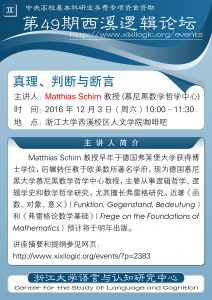Matthias Schirn: Truth, Judgement and Assertion
Speaker: Prof. Matthias Schirn (Munich Center for Mathematical Philosophy, University of Munich)
Date & Time: 3 December 2016 (Saturday), 10:00 – 11:30
Place: Xixi Cafe, Zhejiang University
Abstract: What Frege has bequeathed to us regarding the concept of truth is not a homogeneous, coherent and systematically worked out conception. It is rather an agglomeration of remarks, scattered throughout several of his writings, on the nature of judgement and assertion, the conception of the two truth-values the True and the False as the references of declarative sentences (as objects), the relation of a (true) thought to the True, the role and the purportedly unique sense of the word “true” and its alleged redundancy on the level of both sense and assertion, the characterization of logic as the science of the most general laws of truth, the “truth-conditional“ approach concerning the semantics of his formal language — to mention some issues, but not all.
The core of my talk will be a critical examination of what Frege says in some key passages about truth, the True and “is true”. Where it seems useful and enlightening, aspects of the current discussion of the concept of truth — for example, the role of this concept in minimalism about truth — may be taken into account. I shall argue (a) that Frege’s reflections on the relation of a (true) thought to the True are incoherent; (b) that he fails to offer a convincing argument for rejecting the view according to which a sentence of the form “The thought that p is true” expresses the subsumtion of a thought (qua object) under the concept is true; (c) that Frege seems to overlook the fact that in such a sentence, even if it is interpreted as expressing a subsumtion of this kind, we still have the relation of sense to reference, of a thought to a truth-value; (d) that he falls short of providing a cogent argument for the purported synonymy of “p” and “The thought that p is true” and thus for the alleged redundancy of “is true” on the semantic level; (e) that, contrary to what he says, he has to concede that the word “true” makes an essential contribution to the thought expressed by “The thought that p is true”; (f) that there are indispensable uses of the truth-predicate anyway, not only in sentences such as “Everything Peter says is true” but also, for example, in informal “metalogical” discourse; (g) that, contrary to what Frege appears to claim, he is committed to acknowledging that true is a property (of true thoughts); (h) that it remains unclear what truth qua that which is acknowledged (but not predicated) in a judgement is supposed to be if it is neither the True nor the concept is true.
More details: download here
(本活动受中央高校基本科研业务费专项资金资助)


